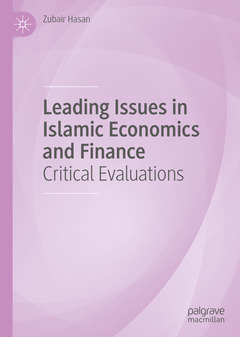Leading Issues in Islamic Economics and Finance, 1st ed. 2020 Critical Evaluations
Auteur : Hasan Zubair

Examines Islamic economics afresh in the light of updated literature
Explores the role of the state in directing the economy toward achieving Islamic goals of development
Keeps the feasibility aspect of its theoretical constructs in the forefrontDate de parution : 09-2020
Ouvrage de 402 p.
14.8x21 cm
Disponible chez l'éditeur (délai d'approvisionnement : 15 jours).
Prix indicatif 137,14 €
Ajouter au panierThème de Leading Issues in Islamic Economics and Finance :
Mots-clés :
Islamic Economics; Islamic Finance; Basel Accords; Islamic Banks; Musharakah; Falah



